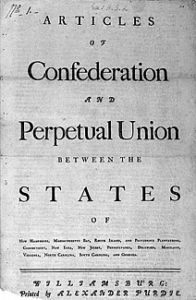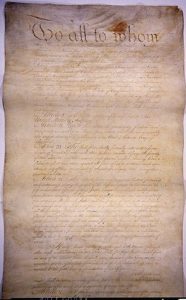On March 1, 1781, the first constitution of the United States, called the Articles of Confederation and Perpetual Union, officially became the first American covenant of law. Since the ratification required all 13 colonies to agree before it could be finalized, there were 39 months between the first colony, Virginia, who ratified in December of 1777, and Maryland, who ratified it in February of 1781.
It is popular today to assume that the belief that men and women can solve all problems without God or the Bible (the “enlightenment”) was the dominant influence at the time of our Declaration of Independence and the writing of our first (Articles in 1781) and subsequently final (1789) Constitution. However, this is simply not supported by a more thorough scholarship which affirms that orthodox Protestant beliefs, rooted in the Scriptures, was the most influential ideology that directly affected the writing of these documents. It was biblical ideas that found their way into our laws, form of government and philosophy of rights at the formative period of the United States.
 There were several plans to join the thirteen original British colonies into one nation that took place from 1650 to 1750. All of these, including Franklin’s Albany Plan of Union in 1754, were ultimately rejected because the balance of power between the individual colonies and a central government could not be agreed upon. Increasingly, the clergy in the colonies presented the idea that the way ancient Israel had been governed before it chose a King was the best model for a “republic.” This laid the ultimate sovereignty in God through the people, and then the tribes were sovereign with well defined powers being given to the central national government of Israel. In other words, this was bottom-up, from the individual to the family, priesthood, tribe and nation. Then the American Revolution occurred, and the need for union was back on the table out of necessity.
There were several plans to join the thirteen original British colonies into one nation that took place from 1650 to 1750. All of these, including Franklin’s Albany Plan of Union in 1754, were ultimately rejected because the balance of power between the individual colonies and a central government could not be agreed upon. Increasingly, the clergy in the colonies presented the idea that the way ancient Israel had been governed before it chose a King was the best model for a “republic.” This laid the ultimate sovereignty in God through the people, and then the tribes were sovereign with well defined powers being given to the central national government of Israel. In other words, this was bottom-up, from the individual to the family, priesthood, tribe and nation. Then the American Revolution occurred, and the need for union was back on the table out of necessity.
When Franklin proposed a plan to the Continental Congress in 1775 it was basically ignored because its central government held too much power to be considered. On June 12, 1776 the Continental Congress resolved “That a committee be appointed to prepare and digest the form of a confederation to be entered into between these colonies.” The committee was composed of one member from each of the thirteen colonies. Since this proposal was three weeks before Independence was declared, it met in secret. John Dickenson of Pennsylvania probably penned the first draft of the Articles to the Congress on July 22nd. It was debated for 16 months until the final draft was approved on November 15, 1777.
As Archie Jones states in his booklet America’s First Covenant (p. 6), “The major issues were representation of the state in Congress, the basis of taxation of the states, and the control of western lands. The fundamental issue, however, was the problem of sovereignty – whether the location of ultimate human political authority would be in the central government (Congress) or the states. The debates in Congress determined that sovereignty would reside in the states.” Now the issue of sovereignty was red hot as it was debated for more than three years at the state and colony level.
New Hampshire and Massachusetts had most of the debates take place in local towns, while the other colonies debated the issues in their legislatures. The amazing thing to consider is how literate the individuals and representatives were in every colony about government and particularly the Biblical idea of local self-government in the people and the caution of yielding too much power to a central government. These principles do not come from simply surveying the most popular governments of the time for those were monarchies. Neither did it come from other religions which produce centralized empires. These ideas were uniquely biblical, embedded in the people, which made America unique.
 Our first constitution, the Articles of Confederation, included many biblical ideas. Though the balance of power was debated, there were no debates on key concepts drawn from the Bible for they were unanimously agreed upon:
Our first constitution, the Articles of Confederation, included many biblical ideas. Though the balance of power was debated, there were no debates on key concepts drawn from the Bible for they were unanimously agreed upon:
- The Sovereignty of God – in the Year of Our Lord (Preface)… the Great Governor of the World… (Art. XIII) These phrases indicate that God governs the world and Jesus Christ is Lord of history.
- Government by Covenant – the very word “confederation” has as its root the word federal, which Webster’s defines as “an agreement or covenant between parties” – first with God, then with each other.
- The sinful nature of Mankind – this biblical doctrine caused checks and balances to curb self-interest and protect the people from the abuse of power on one hand and unbridled democracy on the other. Examples of these checks include a) annual elections; b) state rights to recall delegates; c) freedom of speech and debate; d) prohibiting titles of nobility (entitlements); e) prohibition of holding two positions where it might concentrate power.
- Representative government – electing representatives is essential if a government is modeled after the Hebrew Republic of the Old Testament and as the Articles declared, “Delegates shall be annually appointed in such manner as the legislatures of each State shall direct.”
- The Rule of Law – “The United States in Congress assembled shall also be the last resort on appeal in all disputes…” – the rule of law and not governmental power would resolve issues.
- Protection of life, liberty and property – throughout the document, the protection of state government and its sovereignty was intended to protect the individual basic unalienable rights.
A perusal of the state of the world and its governments at the time reveal how unique this first expression of government was. The vast majority of nations were variations of monarchies where power was top-down and centralized. England had strayed from her unique history and was now functioning in such a fashion. For delegates of thirteen small colonies to not only stand for their God-given rights, but declare Independence (a charter), and then form their own by-laws (the Articles) of their own volition, drawing key ideas from the Scriptures, was unique indeed.
Though the balance of power between state and federal was soon found inefficient for many reasons, the basic ideas of government listed above remained as pillars in our present Constitution. The Constitution of 1787, ratified in 1789, produced a truly unique balance between state and national sovereignty where the federal government acted on the people as one nation, but kept state government sovereignty intact. No such government, since ancient Israel, had such a balance of the one, the few and the many. As Americans we ought to thank God for such a miracle, for most across the globe have never experienced such protections of God-given life, liberty and property!







